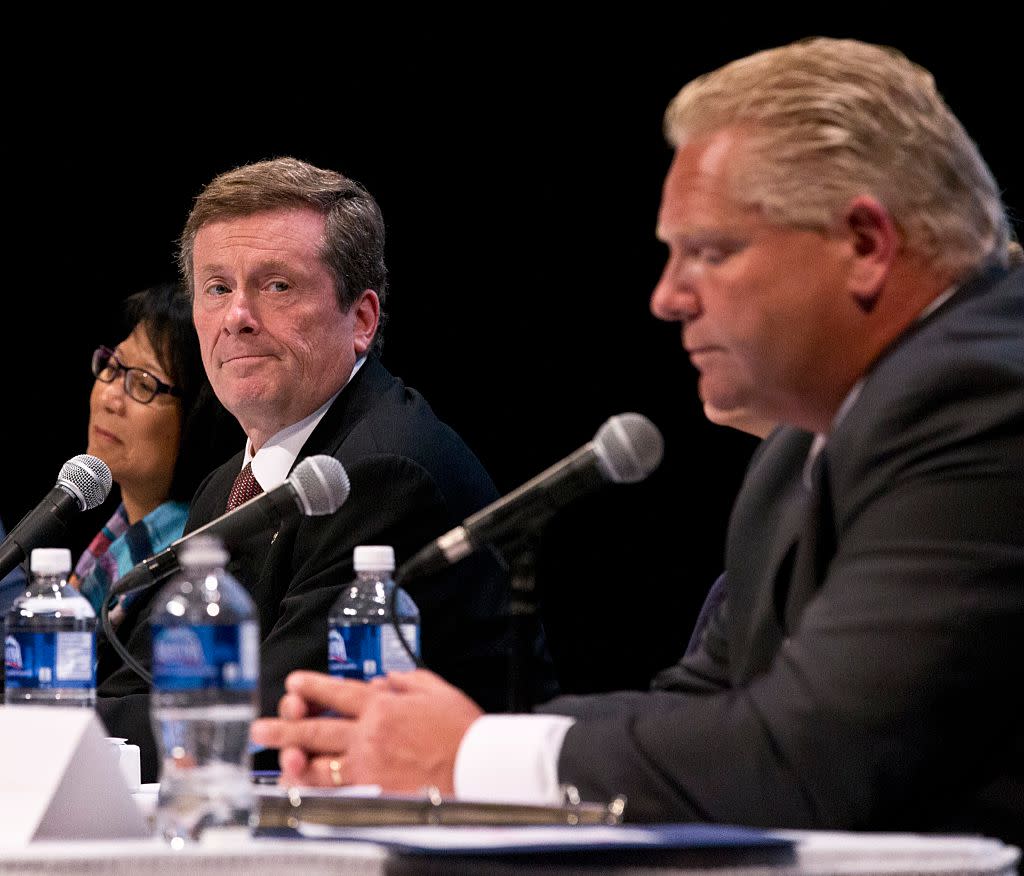How will Ontario's provincial election influence Toronto's mayoral race?

He may not be a candidate anymore, but does that mean Doug Ford is done swaying the outcome of Toronto’s upcoming mayoral race?
Having defeated Ford in the 2014 election, Mayor John Tory will run for re-election in October this year, only four months after the provincial race Ford is now running in as head of the Ontario Progressive Conservatives.
Tory’s only declared opponent right now is first-time candidate Sarah Climenhaga, a community advocate. Perennial candidate James Sears, the editor of a Toronto neo-Nazi newsletter, was rumoured to be in the race, but has since announced he’ll attempt to replace Liberal MPP Yasir Naqvi in Ottawa in the provincial election.
But it’s as Oct. 22 — election day — draws near that political strategist Jim Warren thinks Tory should be prepared to put up a fight.
“The challenge for the mayor’s race in Toronto with John Tory is that he won’t know who’s going to run against him until the 11th hour,” Warren said.
How Ford fares in the provincial election could influence who that candidate is, and on how many fronts Tory — former leader of the PC party but notoriously centrist among his peers — is forced to fight.
Although between Ford and Tory, the association feels more personal, Tory could also find his bid for another term impacted by the performances of provincial NDP candidate Andrea Horwath and incumbent Liberal Premier Kathleen Wynne.
With only months between the two elections, anyone who doesn’t achieve their desired outcome in the provincial election could immediately shift their focus toward municipal politics. For Tory, that could mean adjusting his platform to compete against last-minute opponents from the left, the right, or both.
“[Tory] can run a strong campaign against the left or against the right,” Warren said. “But his challenge is that he’s in the middle. So if he has to run a two-front campaign, he’ll get really pulled apart.”
For example, if the upheaval pollsters are predicting takes place and Ford wins, some of the dozens of Liberal cabinet ministers who lose their jobs might set their sights on Tory’s.
“Someone who is a cabinet minister and a provincial member of the Wynne government could lose their seat,” Warren said, “dust themselves off, and then register to run in the mayor’s race in their local municipalities.”
The same could be said if Ford loses to Wynne or Horwath.
“If the Tories don’t make the inroads that some people expect and the Liberals hold on,” Warren said. “Then there’s gonna be a different dynamic and someone from the right might try and take a run at John Tory from there.”
And if the PCs do win, the fact that Tory and Ford have both held the same position within the Progressive Conservative Party — Tory led the party from 2004 to 2009 — and their platforms in the 2014 mayoral race were similar, might not stop the party from urging another candidate to run against Tory this year.
After all, Ford and Tory have shown there’s no love lost between them, with Ford accusing Tory of letting city spending “skyrocket” when he announced he’d run for mayor last November, and Tory mocking Ford for his flighty political ambitions and for making the announcement from his mother’s basement.
On the other hand, if the PCs win, a new, more right wing mandate in the provincial legislature could work to Tory’s advantage, especially if a right wing candidate enters the mayoral race.
Warren pointed out that Ontarians tend to vote contrary to whichever party forms the federal government, so the further left the federal government is, the further right the provincial government tends to be, and vice versa. Torontonians, Warren said, often behave the same way.
“I actually think if Doug Ford becomes premier, there’ll be a bit of a backlash in the city and they’ll want more checks and balances in place,” he said.
“And there’ll be more of a push to keep someone like John Tory there who would actually maybe swing toward the left wing.”
So maybe John Tory and his supporters don’t have so much to worry about.
After all, a Forum Research poll from February — taken of 977 randomly selected Toronto voters — put the mayor’s approval rating at 58 per cent, up five percentage points since November.
Ultimately, Tory, and Toronto, will have to wait until more mayoral candidates throw their hats into the ring to understand how much, if at all, the provincial election will affect the city’s.
“It’s all speculation right now,” Warren said. “But it’s a fascinating story.”
What do you think of Doug Ford’s chances in the premier’s race? What about John Tory’s re-election? Be sure to vote in our poll above and leave your comments below.


